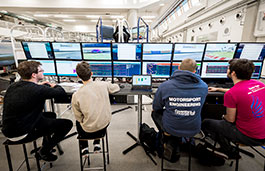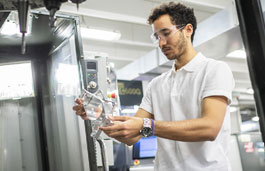Search
Manufacturing Engineering MEng/BEng (Hons)
Study level: Undergraduate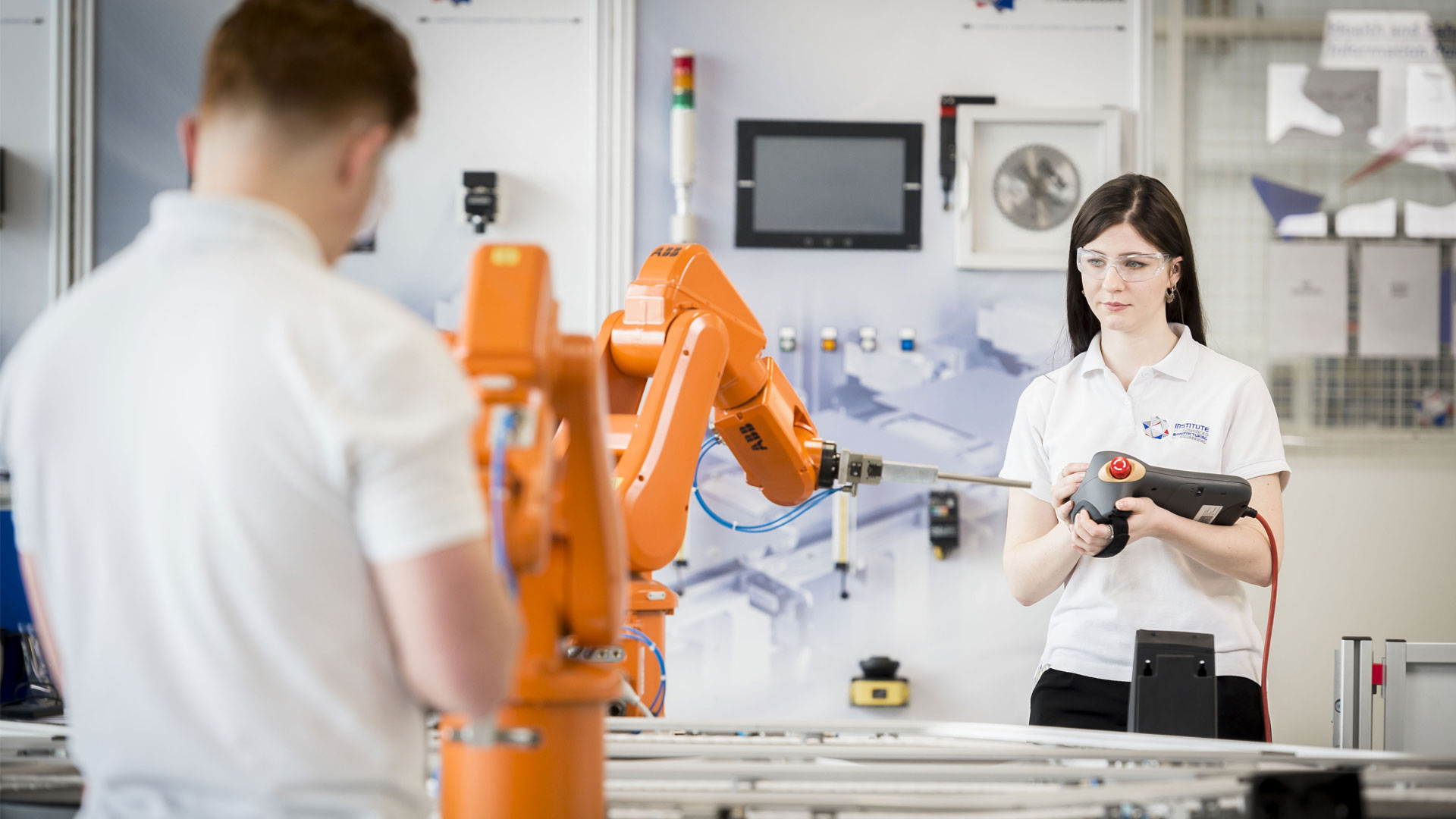
We aim to produce graduates with the versatility and depth of understanding to deal with new and unusual challenges in mechanical engineering, alongside the necessary imagination and creativity to innovate.
Course option
Year of entry
Location
Coventry University (Coventry)
Study mode
Full-time
Sandwich
Duration
BEng:3 years full-time4 years sandwich
MEng:4 years full-time5 years sandwich
UCAS codes
H700 / H702
Start date
September 2024
Course overview
Your learning is designed to be grounded in practical real-world application inspired by Unipart’s experience.
In 2019, the Manufacturing Engineering degree programme, as part of Coventry University’s Institute for Advanced Manufacturing and Engineering (AME), was awarded the Queen’s Anniversary prize 2019 for developing industry-ready graduates.
- We currently have strong employer links with a range of companies, such as Aston Martin, JLR, Prodrive, MIRA, Triumph Motorcycles, BAE Systems and Rolls Royce.
- This degree course also aims to provide you with the opportunity to directly access Unipart's operations, working on some of their 'live' issues in a real-world manufacturing production environment, as well as being able to access the university’s modern High Performance Engineering Centre2.
- You will have the opportunity to gain industrial experience, apply your knowledge and learning to real ‘live’ industrial problems in each year of the degree programme2.
Rated Gold Overall
Teaching Excellence Framework (TEF) 20235 QS Stars for Teaching and Facilities
QS Stars University RatingsTop 5 Student City in England (Coventry)
QS Best Student Cities Index 2025Why you should study this course
- Opportunity to participate in field trips abroad, which have previously included trips to Poland, Bulgaria, China, Belgium and USA2.
- Access to industry-standard software, such as Computer Aided Design (CAD), Finite Element Analysis (FAE) and Computer Fluid Dynamics (CFD) mathematic modelling software4.
- A dedicated industrial placement tutor will aim to help you with your applications for placements and support you if you choose to spend a year in industry (subject to availability)2. Past placements have included roles in Aston Martin Lagonda, Unipart, Babcock International Group, Cummins, GE-Aviation and GKN.
- Access to extensive modern facilities in our High-Performance Engineering Centre, which houses a 20% scale model wind tunnel, composites lab, metrology lab, four-post shaker rig, flow lab, AVL engine test cell, automotive workshop, fatigue and tensile testing (Instron), a full-size Harrier Jet, three further simulators, civil engineering specialist testing equipment, a range of Computerised Numeric Control (CNC) machinery and a laser workshop4.
- The 'Faculty on the Factory Floor' initiative should enable you to learn about and experience the latest technology on the manufacturing front line, which includes state-of-the-art robotic automation, forming, joining, analysis and simulation, metrology and product verification technology4.
Accreditation and professional recognition
The degree is accredited1 and recognised by the following bodies:
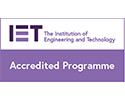
The Institution of Engineering and Technology (IET)
Manufacturing Engineering MEng is accredited by the Institution of Engineering and Technology (IET) for 2023-24 entry on behalf of the Engineering Council for the purposes of fully meeting the academic requirement for registration as a Chartered Engineer.
Manufacturing Engineering BEng (Hons) is accredited by the Institution of Engineering and Technology (IET) for 2023-24 entry on behalf of the Engineering Council for the purposes of partly meeting the academic requirement for registration as a Chartered Engineer.
What you'll study
Our main study themes are:
- Science and Technology: the course aims to provide essential underpinning science and technology necessary for today’s engineer.
- Design and Manufacture: the innovative resolution of design and manufacture problems focused on commercially viable solutions.
- Manufacturing Analysis: on successful completion you should have learnt to use industry-standard software to model, analyse and validate process and systems.
- Sustainability: the course aims to give an understanding of the need for ethical approaches in manufacturing industries and protecting the environment with respect to manufacturing engineering processes and management.
- Practical: opportunities to investigate and analyse using laboratory, workshop and computer-based techniques. You will also have the chance to apply your learning to real, ‘live’ industrial projects throughout the Manufacturing Engineering degree course as part of the ‘Faculty on the Factory Floor’ initiative, a remit of the Institute for Advanced Manufacturing and Engineering.
We regularly review our course content, to make it relevant and current for the benefit of our students. For these reasons, course modules may be updated.
How you'll learn
Our courses are based on a series of lectures, with tutorial sessions, associated practice, laboratory exercises and workshop exercises at both Unipart and the university.
These exercises aim to provide practical, hands-on project work, designed to help solve ‘real-life’ manufacturing issues at Unipart’s manufacturing facility. Previously, past students have optimised product lines and made them more efficient, for example, or analysed defects to find the root cause and proposed cost-effective ways of avoiding defective components.
Teaching contact hours
We understand that everyone learns differently, so each of our courses will consist of structured teaching sessions, which can include:
- On campus lectures, seminars and workshops
- Group work
- Self-directed learning
- Work placement opportunities2.
If you would like more information, you can request information about teaching hours.
The number of contact hours may vary from semester to semester, however, on average, studying the 3-year Manufacturing Engineering BEng degree programme and for the first 3 years of the Manufacturing Engineering MEng degree programme, it is likely to be around 23 contact hours per week in the first year, around 20 contact hours in the second year, and around 19 hours in the final (third for MEng) year.
In the fourth year of the Manufacturing Engineering MEng degree programme, you will have around 15 contact hours per week, as you should become a more independent learner.
In addition, you will be expected to undertake significant self-directed study, approximately 16-20 hours each week, depending on the demands of individual modules.
As an innovative and enterprising institution, the university may seek to utilise emerging technologies within the student experience. For all courses (whether on-campus, blended, or distance learning), the university may deliver certain contact hours and assessments via online technologies and methods.
Since COVID-19, we have delivered our courses in a variety of forms, in line with public authority guidance, decisions, or orders and we will continue to adapt our delivery as appropriate. Whether on campus or online, our key priority is staff and student safety.
Assessment
This course will be assessed using a variety of methods which will vary depending upon the module.
Assessment methods include:
- Formal examinations
- Phase tests
- Essays
- Group work
- Presentations
- Reports
- Projects
- Coursework
- Exams
- Individual assignments
- Laboratories
- Posters
The Coventry University Group assessment strategy ensures that our courses are fairly assessed and allows us to monitor student progression towards achieving the intended learning outcomes.
International experience opportunities
The university is committed to providing a global educational experience and we aim to provide opportunities to participate in several collaborative projects2. Past first-year students visited the Warsaw University of Technology in Poland to undertake workshop and computer aided manufacturing skills in an overseas environment. Other past students have taken part in a collaborative project, developing universal healthcare solutions working with the university’s Occupational Therapy students alongside six other institutions from around Europe, participating in international innovation and creativity programmes in Ruse, Bulgaria and Hasselt, Belgium.
We organise a range of overseas field trips, which have previously included: test work at the General Motors (GM) proving ground; a tour of the Ford F150 factory in Detroit, USA; a tour of Hirata, a Japanese Tier 1 automotive supplier for Ford, Chrysler and GM; participation on a certificated training course with Altair on Inspire; and visits to Mahle Powertrain, the University of Michigan and Chrysler Building2.
Entry requirements
Typical offer for 2024/25 entry.
Not got the required grades? We offer this degree with an integrated foundation year.
Fees and funding
| Student | Full-time | Part-time |
|---|---|---|
| UK, Ireland*, Channel Islands or Isle of Man | £9,250 per year | Not available |
| EU | £9,250 per year with EU Support Bursary** £19,850 per year without EU Support Bursary** |
Not available |
| International | £19,850 per year | Not available |
If you choose to do a work placement2, you should consider travel and living costs to cover this. There is also a tuition fee3 of £1,250 that will cover your academic support throughout your placement year.
For advice and guidance on tuition fees and student loans visit our Undergraduate Finance page and see The University’s Tuition Fee and Refund Terms and Conditions.
We offer a range of International scholarships to students all over the world. For more information, visit our International Scholarships page.
Tuition fees cover the cost of your teaching, assessments, facilities and support services. There may be additional costs not covered by this fee such as accommodation and living costs, recommended reading books, stationery, printing and re-assessments should you need them. Find out what's included in your tuition costs.
The following are additional costs not included in the tuition fees:
- Any optional overseas field trips or visits: £400+ per trip.
- Any costs associated with securing, attending or completing a placement (whether in the UK or abroad).
- Travel costs to the Unipart site.
*Irish student fees
The rights of Irish residents to study in the UK are preserved under the Common Travel Area arrangement. If you are an Irish student and meet the residency criteria, you can study in England, pay the same level of tuition fees as English students and utilise the Tuition Fee Loan.
**EU Support Bursary
Following the UK's exit from the European Union, we are offering financial support to all eligible EU students who wish to study an undergraduate or a postgraduate degree with us full-time. This bursary will be used to offset the cost of your tuition fees to bring them in line with that of UK students. Students studying a degree with a foundation year with us are not eligible for the bursary.
Facilities
Manufacturing students study in our award-winning Institute for Advanced Manufacturing and Engineering (AME), a collaboration between Coventry University and Unipart Manufacturing4.
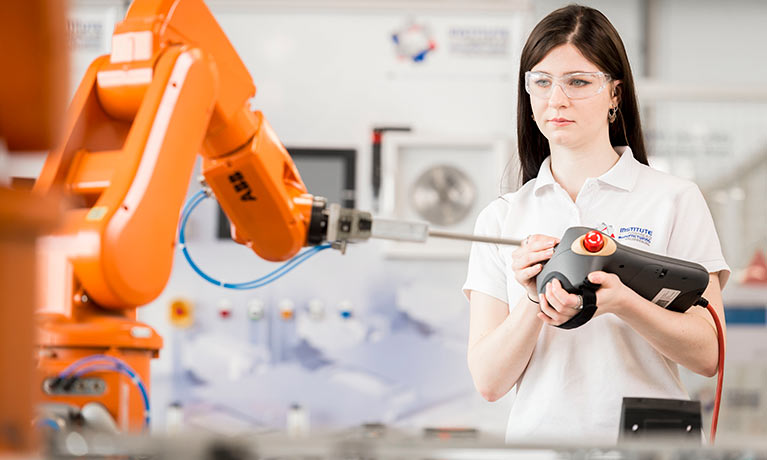
Faculty on the factory floor
AME brings together academia, industry, and research and development in a ‘live’ manufacturing environment. Our collaboration with Unipart gives you the opportunity to work with some of the most talented engineering professionals in the UK.
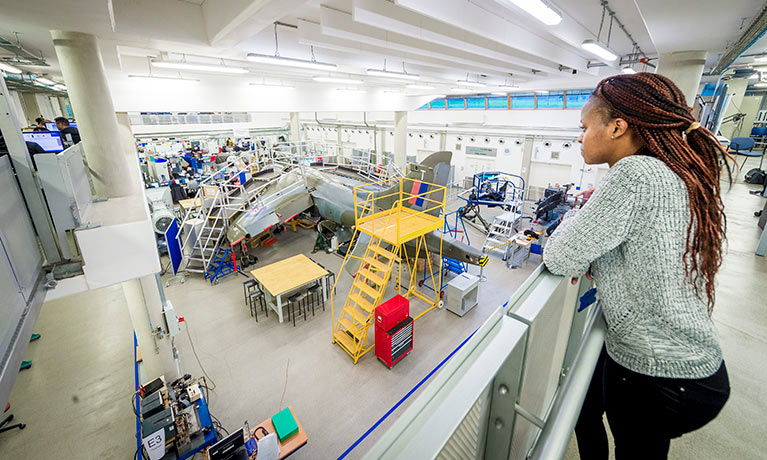
High Performance Engineering Centre (HPEC)
Situated on the ground floor of our Engineering and Computing Building, the centre houses flight and driving simulators, a chassis design assembly and test facility, wind tunnels and a fleet of CNC manufacturing machines.
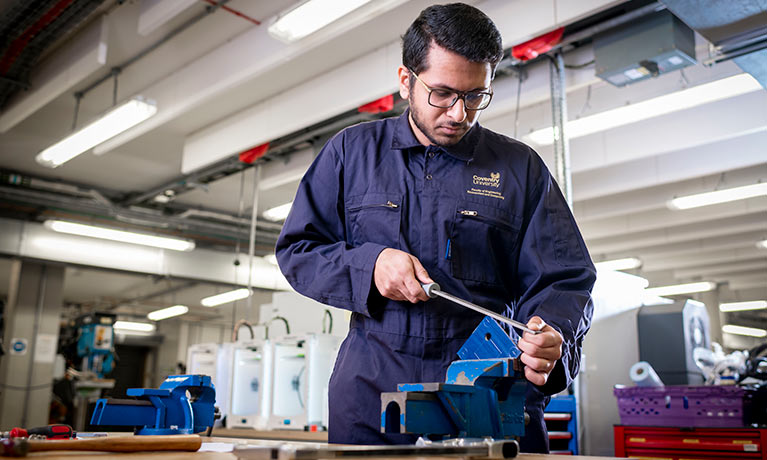
Metals Workshop
Participate in technical work in a hands-on way. The workshop includes lathes, milling machines, fabrication equipment for sheet metal work, CNC machines, work benches, welding lines and a fitting assembly area.
Careers and opportunities
Our current collaboration with the Unipart Manufacturing Group aims to ensure this course is highly vocational in nature, designed to produce ‘industry ready’ graduates, who, on successful completion of this course, are prepared for any role they obtain in industry.
Upon successful completion of the course, you will have gained knowledge of:
- The function, materials, manufacturing processes, technologies and assembly of a range of engineering products.
- The principles of engineering science and mathematics and their application to design, production, use and service of a range of manufactured products.
- Design principles for products and systems that meet technological and business market requirements and constraints.
- Operations management, product planning/control methods and quality techniques at different levels of factory and supply chain hierarchy.
- Sustainable engineering, business and knowledge management practices within a global context.
- Engineering management of people, processes and projects (at tactical and strategic levels).
You will be able to:
- Model and analyse innovative engineering systems using appropriate engineering science and mathematical modelling techniques, including computer-based techniques.
- Synthesise solutions to iterative and innovative engineering design problems.
- Independently research topics, evaluating findings to determine new or novel information that contributes effectively to solving engineering problems.
- Justify engineering and commercial decisions for product or operational choices within complex engineering systems across the product lifecycle.
- Operate effectively and safely a range of manufacturing related technologies or projects within an industrial context.
- Use commercial software in the evaluation of problems and in the determination and optimisation of solutions.
- Work effectively and constructively within project teams.
- Research and investigate problems individually, generating and justifying approach, analysis, solution and final recommendation to a practical engineering problem.
We aim for you to graduate with comprehensive knowledge of a range of manufacturing principles, having the opportunity to learn the skills needed to apply new technologies to the solution of manufacturing problems in an industry environment.
Coventry University is committed to preparing you for your future career and giving you a competitive edge in the graduate job market. The university’s Talent Team provide a wide range of support services to help you plan and prepare for your career.
Where our graduates work
Lotus Cars, Mercedes F1, Aston Martin, BAE, Meggit, Arrrowsmith, Rolls Royce Aero, Quest, Unipart Group to name a few.
Further study
Graduate Immigration Route visa
Based on current information from the UK Government, international students whose study extends beyond summer 2021 may be eligible for a visa under the UK Government’s Graduate Immigration Route, which will enable students to stay and work, or look for work, in the UK at any skill level for up to two (2) years. Check the most up to date guidance available to check your eligibility and any updates from the UK Government before making an application or enrolment decision.
How to apply
You may also like
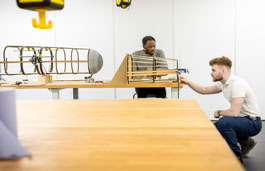
Automotive Engineering MEng/BEng (Hons)

Mechanical Engineering MEng/BEng (Hons)
